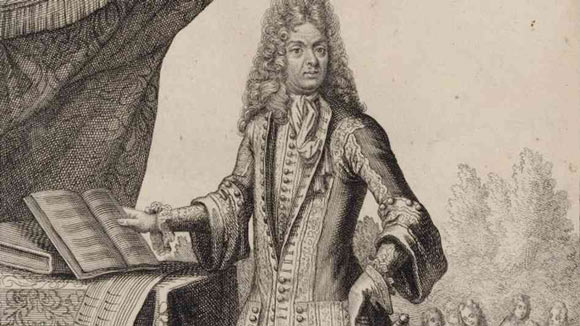
Jean Baptiste Lully, also known by his Italian name Giovanni Battista Lulli, born on November 29, 1632 in Florence, was a musician who composed operatic and court music in France. His work was admired so much that from 1662 he had complete control over French court music and his composition style was followed by composers all over Europe.
Born an Italian, Lully francized his name when he was granted French citizenship. Little is known for fact about his early life but it is speculated that Duke de Guise took him to France. He joined the string ensemble of the Duchess of Montpensier but was forced to leave for some scandalous musical and lyrical composition. In 1652 or 1653 he got himself membership in the violin ensemble of King Louis XIV’s court. Being an ambitious musician, Lully rose quickly from being a violinist in the King’s court to the composer of all the dance music in the royal court. Not only that, he also became the leader of Petit-Violons du Roi (The King’s Violins).
He didn’t stop at that either. From 1661 he got appointed as the musical composer to the king and a year later (from 1662) the royal family’s music master. His bigger achievements however came afterwards. After getting these appointments he contacted Pierre Perrin, the founder of Académie Royale de Musique which eventually became Opéra de Paris, and Robert Cambert, both of whom worked together, and acquired from them their patents for the production of opera music and by 1974, every opera that was ever performed could only be performed once Lully permitted it. He also received his nationalization letters and was granted nobility in 1681. In addition to that he was also appointed the position of royal secretary, a position commonly held only by French aristocrats.
In the beginning of his music career his operatic style had been considered similar to that of two Italian master of music, Luigi Rossi and Francesco Cavalli. However, he rapidly adopted the French operatic style and is said to have created his own new and completely original style. He brought a lot of novelty into the French opera. This includes the introduction of new dances like the minuet, and an increased usage of quicker dances like the gigue, bourrée and the gavotte. In addition to that he also introduced female dancers in his ballets. Lully wrote most all his operas and most of his ballets in French. Due to the mature drama and theatricality in his operas, his work was often termed as “tragedies set to music”.
Lully brought huge developments to the French opera. He substituted the recitativo secco style preferred by Italian operatic musicians with recitative, a style known for its highly dynamic rhythm and the vigilant character of the words used. He also established a method of declamation that was fitting for the French language. This led to more freedom in terms of the word setting for the operas, resulting in the French opera procuring further steadiness and permanence. His operas often conclude with a chaccone movement, something that was adopted by two famous and important musicians, Christoph Gluck and Jean-Philippe Rameau. Lully created a huge collection of music that was played in the church, ballets, operas and the theatre.
Jean Baptiste Lully died on March 22, 1987 in Paris from gangrene which was caused by him hitting his foot with his long conducting staff while attending a performance in which his ‘Te Deum’ was played in celebration King Louis XIV’s recovery.